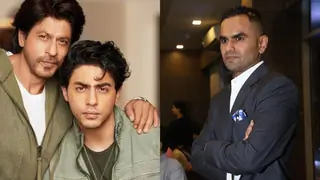Chapter 11 (Teekhi Yaadein)
Rehab Centre – Late Night
The white walls of the centre were silent as always. Outside, the trees rustled with a gentle wind, casting shifting shadows on the windowpane. Inside, Veer sat at his small desk, a dim lamp glowing beside him, pen in hand.
The note from Keerat lay open beside his journal.
“Write a song about your journey — not for the world. For yourself.
And when you’re ready, sing it for me.”
He sighed, running a hand through his hair.
“I’m not ready,” he muttered aloud.
But his hand had already started moving.
Flashbacks Between Lines
As he scribbled the first few lines, memories bled through like ink in water.
Gurleen’s tearful face, the way her voice had cracked when she begged him for forgiveness.
Angad’s hug, firm and unwavering — a silent apology and a louder love.
And Keerat…
That ridiculous box of empty syringes she had handed over. Her eyes blazing, her voice fierce:
“Now that we’re friends, these should prick your conscience...
not your skin.”
Veer’s fingers trembled over the paper. And then he wrote:
(Verse 1)
Thodi si khamoshi thi, thoda sa andhera tha,
Mere andar koi ro reha si, par main khud ton begana tha.
Honthan te muskaan si, par dil chilla ke kehnda si,
"Main theek haan" keh keh ke, har din hor vi mar reha si.
His pen paused.
His breath caught.
He wasn’t writing a song.
He was bleeding truth onto paper.
Healing with Every Verse
Words spilled next — some angry, some quiet, others bruised with guilt.
But through it all, one thread wove its way in and out, like the heartbeat of a prayer.
Keerat.
Her sarcasm, her stubborn warmth.
Her punchy pep talks. Her ability to see through the silence.
She hadn’t saved him with sympathy.
She had dared him to live.
He flipped to a fresh page and began whispering a melody as the next lines formed.
(Pre-Chorus)
Nashe di lakeer vich apna wajood kho baitha,
Rab ton vi rootha, par tere yakeen ne mainu jod ditta.
And then the chorus — tender, resolute, full of heart.
(Chorus)
Teekhi yaadein si, par tu marham ban gayi,
Tere lafzan ne mainu, ek nava sa raah dikhaya.
Jithe har teer si, tu dhaal ban ke khadi rahi,
Tere bharose ne mainu, khud te vishwas dilaya.
A tiny smile ghosted across his lips.
Not a love song. Not yet.
But it was something just as intimate.
A confession of survival.
(Verse 2)
Saari duniya ne keh ditta, “Eh taan khatam ho gaya,”
Tere ik jumle ne bas, saari duniya chupp kara ditta.
"Tu thalle gir gaya, par main tenu chhadangi nahi,"
Keh ke tu mere zakhm vi sambhal gayi.
Veer leaned back in his chair. His eyes flicked toward the drawer.
He opened it slowly — revealing the box of empty syringes.
Still unopened. Still whole.
A relic of his past — and a promise of his future.
(Bridge)
Maafi mangi na tu, par har nazar maaf kar gayi,
Meri har galti nu samajh ke, tu mere sang chal gayi.
Syringe da dabba vi tohfa ban gaya,
Jithon shuru hoyi navi zindagi da gaya.
He stared at the pages he’d just filled.
What do I call this?
His eyes fell again on the box.
Not to glorify pain.
But to remember it.
To own it.
“Teekhi Yaadein” — Pricks of the Past.
Keerat’s Side — Monga House Rooftop
That same night, Keerat sat on the rooftop, arms wrapped around her knees.
Sahiba had texted earlier:
“He reached safe. Looks okay. Quiet.”
But Keerat hadn’t replied. She couldn’t.
There was a strange silence in her heart since she'd seen Veer walk away again — this time into healing, not destruction.
The words she hadn’t let herself say...
The unspoken questions that haunted her...
And the quiet ache of missing someone who now lived behind four white walls.
She looked up at the stars and whispered into the wind:
“Hope you're writing that song, Rockstar…”
Final Lines — Veer’s Room
Somewhere not too far away, a boy with calloused fingers and a healing heart stared at a notebook filled with scars transformed into verses.
His thumb brushed over the title, and he whispered, almost to himself:
“Wait till you hear it, Miss Pehalwan.”
Two Weeks Later – Rehab Centre
It was supposed to be a quiet Saturday afternoon.
The centre was unusually calm — the air heavy with monsoon moisture and the distant smell of wet soil.
Veer was in the music room, alone, strumming the borrowed guitar with a hesitancy that didn’t quite match the words in his head.
He wasn’t writing anymore. Not today.
Today, he was trying to listen — to the things unsaid, the chords unplayed, the song he’d promised he would sing.
Outside the Music Room
Keerat adjusted the scarf over her face as she slipped past the reception area.
She had no real permission to visit.
Only Sahiba’s forged signature on a vague “Brar Foundation Volunteer Pass” and Angad’s half-smirked “You’ll get caught, Keerat” echoing in her head.
But she didn’t care. So here she was.
Sneaking through a rehab corridor.
Because that’s who she was — stubborn and soft in the worst combination.
She peered into the last room on the left. The music room.
And paused.
Inside
Veer was sitting on a low stool, unaware of her presence.
His fingers hovered over the strings. His head was down, his brow furrowed in quiet tension.
Then he inhaled deeply. Closed his eyes.
And began to play.
A soft, trembling chord. Then another.
Keerat’s breath caught.
She didn’t move.
Not even when he began to sing — not with drama or performance, but with a kind of raw, cracked simplicity that made her toes curl inside her shoes.
Veer’s Song — “Chapter One”
I tried to drown the echoes… in the silence of a high,
Built walls with glass and poison… just to learn how not to cry.
But your voice kept breaking through… where even light wouldn’t go,
Not to save me, but remind me — that I still had a soul.
This is not a love song, not a desperate plea,
It’s a whisper to myself of who I’m allowed to be.
You gave me no answers, no perfect lines to quote,
Just the courage to keep breathing… when my hands had slit my throat.
So here I stand, not healed, not whole,
But fighting for fragments I used to disown.
And if I ever learn to love this life again…
This song — this moment — will be Chapter One.
Silence.
The last chord trembled into stillness.
Veer didn’t hear the quiet sniffle near the doorway.
He was still staring at his hands, as if afraid to look up.
And Then...
A voice, soft but unmistakable:
“You absolute idiot.”
Veer startled, his eyes snapping to the door.
Keerat stood there, scarf half-tangled in her elbow, eyes rimmed with tears she hadn’t meant to shed.
“You said you’d sing it when you were ready. Not make me break into a rehab centre like some kind of psycho fan.”
Veer blinked. Then laughed — quietly, breathlessly.
“Didn’t think you'd actually come.”
A pause.
Then Keerat stepped in and shut the door behind her.
The Afterglow of Song
She walked over, slow but steady, until they were inches apart.
Neither of them said anything for a moment.
Then Keerat murmured:
“That was… horrible.”
Veer smiled.
“You cried.”
“I did not.” (She sniffled.)
“You did.”
“Fine,” she snapped, “Maybe just a little. Doesn’t mean it was good. It just meant I was emotionally blackmailed by an ex-addict with a guitar.”
Veer chuckled again, his eyes warm.
“You know what I realized while writing it?”
“That you still sing flat on high notes?”
“That… I wasn’t writing it for you.”
She tilted her head.
“It was a gift from one friend to another,” he said. “But the person I was singing to today — was me.”
That silenced her.
Then, softly:
“I’m glad he finally listened.”
Breaking the Rules to Heal the Wounds
The following Saturday, Veer was in group therapy, half-listening to a man talk about his relapses when his phone buzzed. Technically, phones were allowed only during supervised calls—but Keerat had slipped his in weeks ago with the subtlety of a thief and the audacity of a hurricane.
1 New Message
From: Pehalwan-in-Chief
"Your therapist may be good, but can he make aloo paratha like me? No? Then shut up and recover."
Veer coughed into his fist to hide his laugh, earning a glare from the facilitator.
From that day on, the rules began bending more than they were followed.
Keerat started sneaking into the rehab every weekend—sometimes even midweek. Sahiba covered for her, Angad smuggled in supplies (once even a wrestling mat), and Keerat… she brought the one thing the rehab couldn’t offer: fierce, unwavering love disguised as brutal honesty.
Secret Saturdays
She would sneak in through the back gate, dodging the CCTV blind spots Angad had mapped out for her. By now, even one of the guards had started turning a blind eye. He'd once muttered, “Eh chhori toh Veer saab di asli therapy hai,” before waving her in.
She brought Veer books, bad jokes, oddly shaped sandwiches, and sometimes—when he was drowning in the worst of withdrawals—just her presence.
"Stop looking like a kicked puppy," she’d snap. "You're not a victim, Veer. You're a warrior. Warriors stumble. But they get up. So, get up."
"You always this rude to patients?" he’d grumble.
"Only to the ones who flirt with death and expect sympathy."
They’d sit under the big banyan tree behind the centre and talk. Or sit in silence. Or argue about why his music still avoided high notes.
But every visit carved away a little more of his shame. His self-hate. His fear.
The Wall of Wins
By the second month, Veer had transformed his room. Keerat's notes—post-its scribbled with sarcastic motivation—covered his wall.
“You didn’t die, loser. That’s already a win.”
“One more day sober = one more paratha earned.”
“Don’t make me wrestle you into healing. I’ll win.”
“Your rabab misses you, idiot.”
Each note was stuck next to a date. A calendar of progress. A wall of wins.
Some days, when the world felt too loud, Veer would read her notes until the panic settled.
Once, in the middle of a particularly bad night, he called her.
“I feel like I’m slipping,” he whispered.
There was a pause. Then: “Okay. Tell me one thing you like about today.”
“Nothing.”
“Wrong answer. Try again.”
“…I didn’t scream during withdrawal.”
“There you go. You’re not slipping. You’re climbing. Slowly. Painfully. But still.”
He didn’t sleep that night. But he didn’t use either. And that was enough.
A Crack in the Armour
One day, while watching the rain through the glass panel near the staircase, Veer turned to Keerat and asked, “Why do you keep coming back?”
She didn’t hesitate. “Because I believe in you.”
He looked away, nervous. “Even after what I did? What I said?”
“You didn’t know better. You were bleeding and didn’t want anyone to see it. But now? You’re healing. So I’ll keep showing up until you remember who you are.”
There was a pause.
“I wrote another song.”
Keerat grinned. “Good. Because I brought my worst review face today.”
He sang it for her that evening—unplugged, off-key in parts, but so full of truth that Keerat had to bite the inside of her cheek to keep from crying.
Final Therapy
By the third month, the therapists had started noticing.
Veer was sharper. More expressive. More open in group discussions. He’d begun helping new patients adjust. He asked for extra guitar time. He journaled even when no one told him to.
“Something’s shifted,” his primary therapist noted one morning.
Veer smiled. “Yeah. Someone broke into my soul like she broke into this centre—and refused to leave.”
His final psychological evaluation came with an unexpected remark.
Patient has not only shown progress but sustained it. Displays resilience rooted in strong interpersonal motivation. High chance of long-term recovery.
He’d tucked that report behind the first note Keerat ever gave him. The one with the syringes.
The Day of Discharge
It was a cool morning, the kind where the breeze carries the scent of new beginnings. Veer packed his few belongings into a single duffel bag.
The music room key, his journal of unsent letters, a copy of the song Chapter One, and the now-empty wooden box of syringes. He left the box behind in the centre’s therapy library—marked with a note.
“For the next person who needs a reminder of what they’re worth.” – VSB
At the gates, the Brar family was waiting. Sahiba beamed. Angad clapped him on the back. Gurleen wept into his kurta.
But his eyes searched for only one person.
And then she stepped out of Angad’s jeep, her bomber jacket flapping like a battle flag in the wind, combat boots crunching confidently against the gravel. Hair tied in a high ponytail, a faint smear of dust across her cheek from the ride — she looked more like someone walking into a fight than a celebration.
“Miss Pehalwan,” Veer greeted, smiling wide.
She tilted her head. “Mr. Egoistic Shithead.”
They stood still for a moment.
Then Keerat extended her fist. “So? You finally ready for the world?”
Veer bumped her fist with his. “Let’s go make a dent in it.”
As the gates of the rehab shut behind him, Veer didn’t look back.
He didn’t need to.
Because what lay ahead was finally brighter.
He was clean.
He was steady.
And this time… he was ready.
--------
To be continued.
































139